Investigating Training and Development Impact on Tesco Plc Employees
VerifiedAdded on 2021/02/21
|15
|4088
|406
Report
AI Summary
This report investigates the impact of training and development programs on employee performance at Tesco Plc. It begins with an overview of Tesco, its operations, and the significance of the research, along with its limitations. The literature review explores the causes behind training and development programs, their benefits for employees and the company, and the challenges faced by the human resource department in organizing these programs. The research methodology outlines the qualitative research method, Interpretivism research philosophy, Inductive research approach, and descriptive research design used. The report covers data collection methods, ethical considerations, and a timeline for the research. Recommendations are provided, and the report concludes by summarizing key findings and referencing relevant sources. The study aims to analyze the effect of training and development on employee performance, identify the reasons behind conducting such programs, evaluate their benefits, and suggest solutions to overcome challenges faced by the HR department.

Advanced Business Research Methods
Paraphrase This Document
Need a fresh take? Get an instant paraphrase of this document with our AI Paraphraser
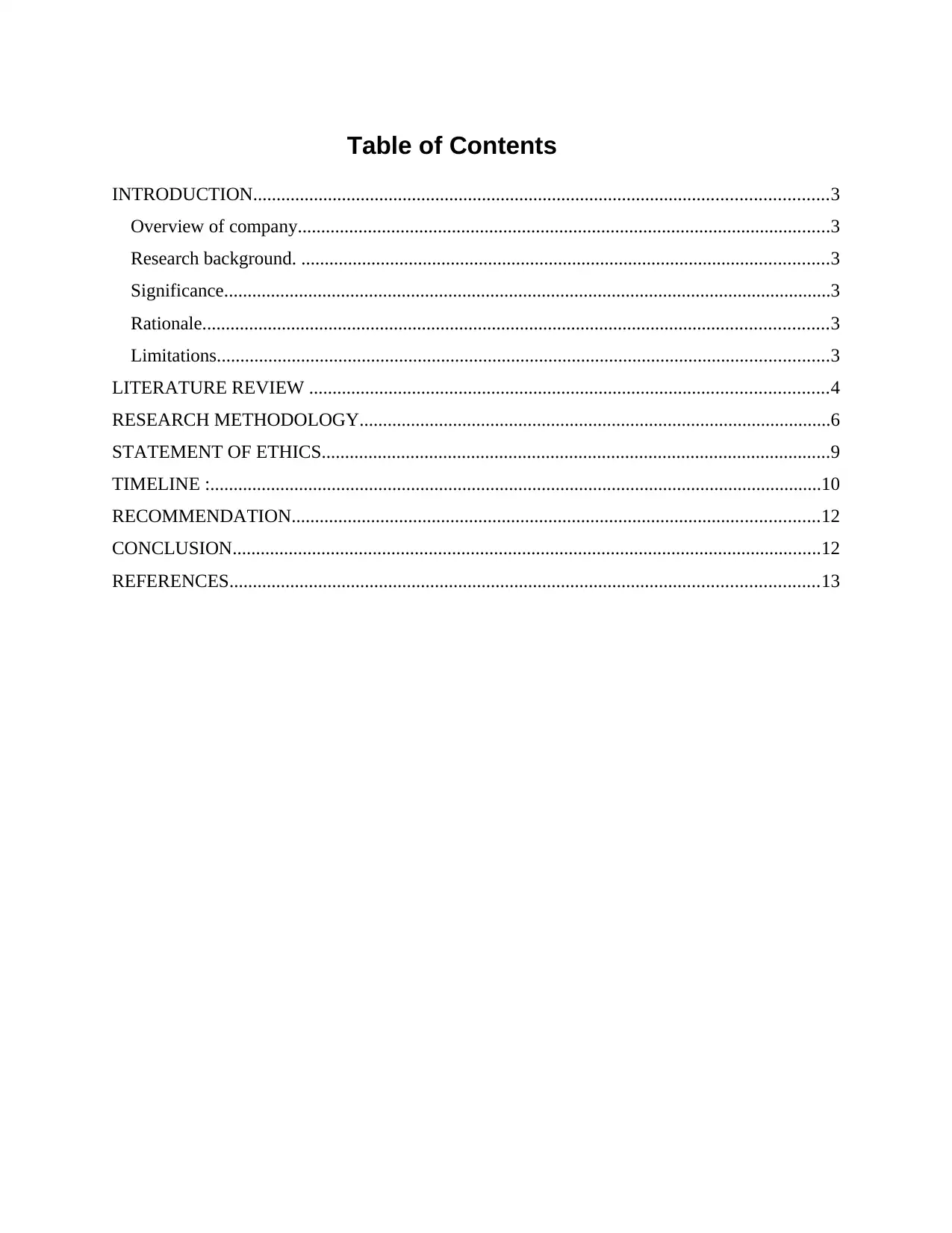
Table of Contents
INTRODUCTION...........................................................................................................................3
Overview of company..................................................................................................................3
Research background. .................................................................................................................3
Significance..................................................................................................................................3
Rationale......................................................................................................................................3
Limitations...................................................................................................................................3
LITERATURE REVIEW ...............................................................................................................4
RESEARCH METHODOLOGY.....................................................................................................6
STATEMENT OF ETHICS.............................................................................................................9
TIMELINE :...................................................................................................................................10
RECOMMENDATION.................................................................................................................12
CONCLUSION..............................................................................................................................12
REFERENCES..............................................................................................................................13
INTRODUCTION...........................................................................................................................3
Overview of company..................................................................................................................3
Research background. .................................................................................................................3
Significance..................................................................................................................................3
Rationale......................................................................................................................................3
Limitations...................................................................................................................................3
LITERATURE REVIEW ...............................................................................................................4
RESEARCH METHODOLOGY.....................................................................................................6
STATEMENT OF ETHICS.............................................................................................................9
TIMELINE :...................................................................................................................................10
RECOMMENDATION.................................................................................................................12
CONCLUSION..............................................................................................................................12
REFERENCES..............................................................................................................................13
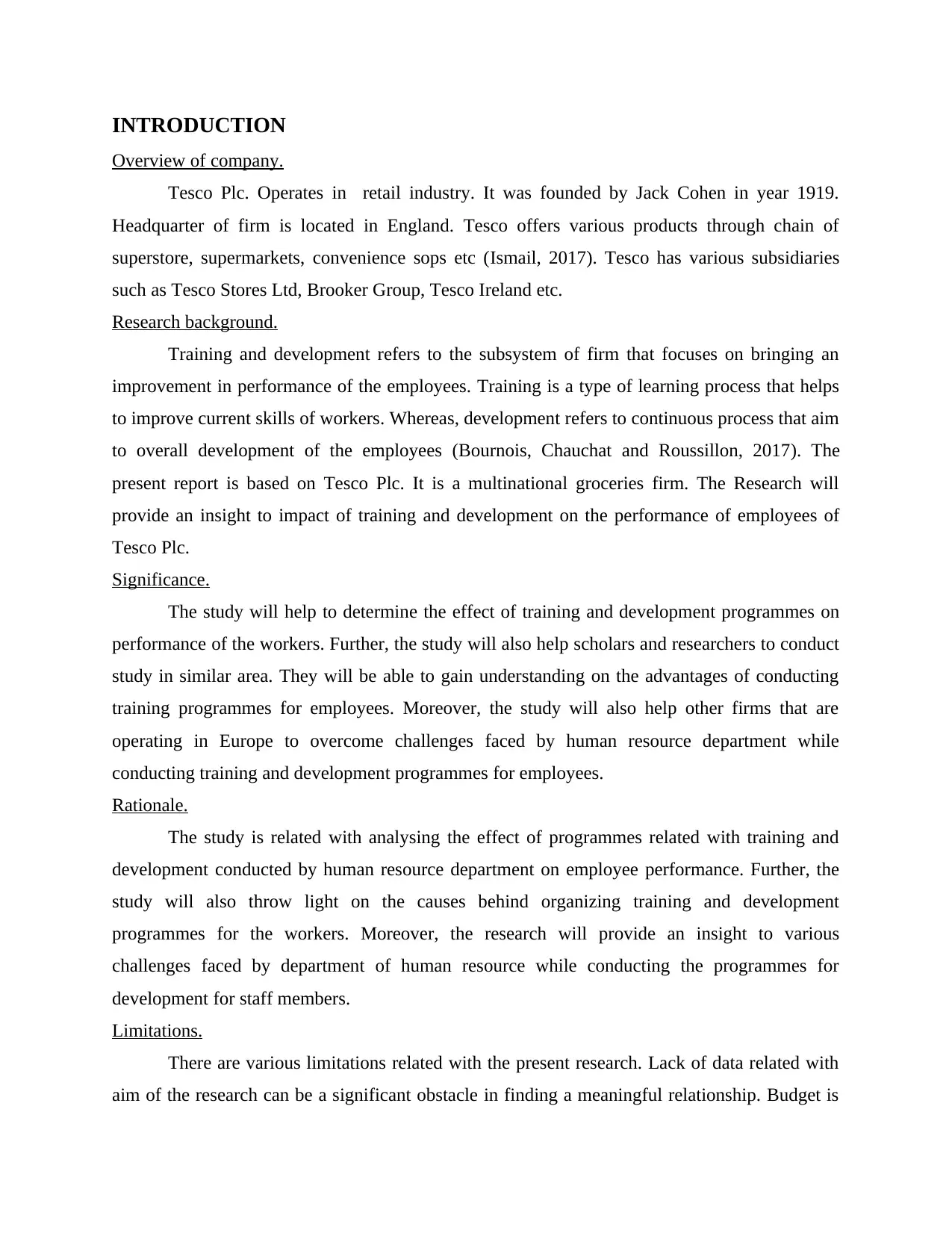
INTRODUCTION
Overview of company.
Tesco Plc. Operates in retail industry. It was founded by Jack Cohen in year 1919.
Headquarter of firm is located in England. Tesco offers various products through chain of
superstore, supermarkets, convenience sops etc (Ismail, 2017). Tesco has various subsidiaries
such as Tesco Stores Ltd, Brooker Group, Tesco Ireland etc.
Research background.
Training and development refers to the subsystem of firm that focuses on bringing an
improvement in performance of the employees. Training is a type of learning process that helps
to improve current skills of workers. Whereas, development refers to continuous process that aim
to overall development of the employees (Bournois, Chauchat and Roussillon, 2017). The
present report is based on Tesco Plc. It is a multinational groceries firm. The Research will
provide an insight to impact of training and development on the performance of employees of
Tesco Plc.
Significance.
The study will help to determine the effect of training and development programmes on
performance of the workers. Further, the study will also help scholars and researchers to conduct
study in similar area. They will be able to gain understanding on the advantages of conducting
training programmes for employees. Moreover, the study will also help other firms that are
operating in Europe to overcome challenges faced by human resource department while
conducting training and development programmes for employees.
Rationale.
The study is related with analysing the effect of programmes related with training and
development conducted by human resource department on employee performance. Further, the
study will also throw light on the causes behind organizing training and development
programmes for the workers. Moreover, the research will provide an insight to various
challenges faced by department of human resource while conducting the programmes for
development for staff members.
Limitations.
There are various limitations related with the present research. Lack of data related with
aim of the research can be a significant obstacle in finding a meaningful relationship. Budget is
Overview of company.
Tesco Plc. Operates in retail industry. It was founded by Jack Cohen in year 1919.
Headquarter of firm is located in England. Tesco offers various products through chain of
superstore, supermarkets, convenience sops etc (Ismail, 2017). Tesco has various subsidiaries
such as Tesco Stores Ltd, Brooker Group, Tesco Ireland etc.
Research background.
Training and development refers to the subsystem of firm that focuses on bringing an
improvement in performance of the employees. Training is a type of learning process that helps
to improve current skills of workers. Whereas, development refers to continuous process that aim
to overall development of the employees (Bournois, Chauchat and Roussillon, 2017). The
present report is based on Tesco Plc. It is a multinational groceries firm. The Research will
provide an insight to impact of training and development on the performance of employees of
Tesco Plc.
Significance.
The study will help to determine the effect of training and development programmes on
performance of the workers. Further, the study will also help scholars and researchers to conduct
study in similar area. They will be able to gain understanding on the advantages of conducting
training programmes for employees. Moreover, the study will also help other firms that are
operating in Europe to overcome challenges faced by human resource department while
conducting training and development programmes for employees.
Rationale.
The study is related with analysing the effect of programmes related with training and
development conducted by human resource department on employee performance. Further, the
study will also throw light on the causes behind organizing training and development
programmes for the workers. Moreover, the research will provide an insight to various
challenges faced by department of human resource while conducting the programmes for
development for staff members.
Limitations.
There are various limitations related with the present research. Lack of data related with
aim of the research can be a significant obstacle in finding a meaningful relationship. Budget is
⊘ This is a preview!⊘
Do you want full access?
Subscribe today to unlock all pages.

Trusted by 1+ million students worldwide
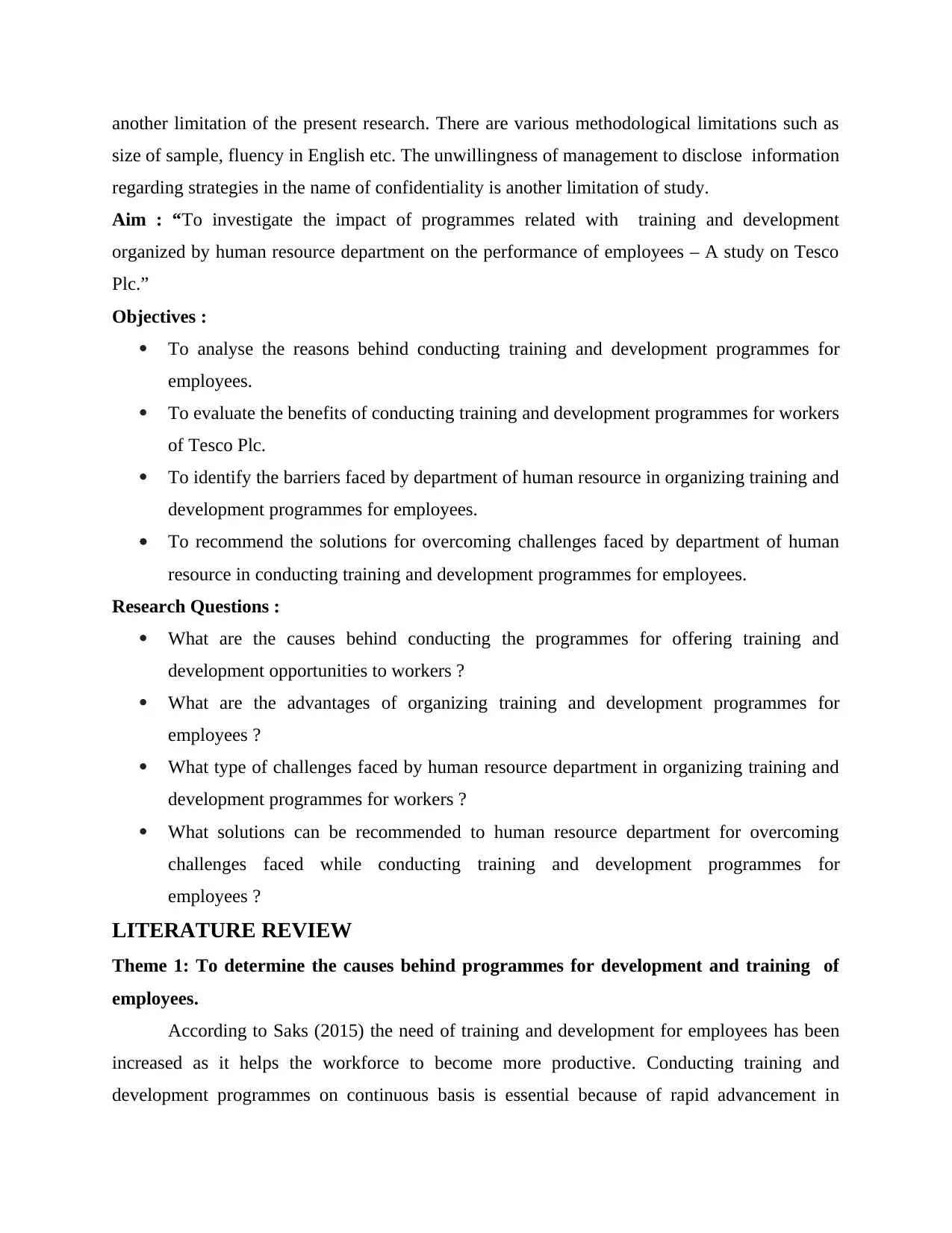
another limitation of the present research. There are various methodological limitations such as
size of sample, fluency in English etc. The unwillingness of management to disclose information
regarding strategies in the name of confidentiality is another limitation of study.
Aim : “To investigate the impact of programmes related with training and development
organized by human resource department on the performance of employees – A study on Tesco
Plc.”
Objectives :
To analyse the reasons behind conducting training and development programmes for
employees.
To evaluate the benefits of conducting training and development programmes for workers
of Tesco Plc.
To identify the barriers faced by department of human resource in organizing training and
development programmes for employees.
To recommend the solutions for overcoming challenges faced by department of human
resource in conducting training and development programmes for employees.
Research Questions :
What are the causes behind conducting the programmes for offering training and
development opportunities to workers ?
What are the advantages of organizing training and development programmes for
employees ?
What type of challenges faced by human resource department in organizing training and
development programmes for workers ?
What solutions can be recommended to human resource department for overcoming
challenges faced while conducting training and development programmes for
employees ?
LITERATURE REVIEW
Theme 1: To determine the causes behind programmes for development and training of
employees.
According to Saks (2015) the need of training and development for employees has been
increased as it helps the workforce to become more productive. Conducting training and
development programmes on continuous basis is essential because of rapid advancement in
size of sample, fluency in English etc. The unwillingness of management to disclose information
regarding strategies in the name of confidentiality is another limitation of study.
Aim : “To investigate the impact of programmes related with training and development
organized by human resource department on the performance of employees – A study on Tesco
Plc.”
Objectives :
To analyse the reasons behind conducting training and development programmes for
employees.
To evaluate the benefits of conducting training and development programmes for workers
of Tesco Plc.
To identify the barriers faced by department of human resource in organizing training and
development programmes for employees.
To recommend the solutions for overcoming challenges faced by department of human
resource in conducting training and development programmes for employees.
Research Questions :
What are the causes behind conducting the programmes for offering training and
development opportunities to workers ?
What are the advantages of organizing training and development programmes for
employees ?
What type of challenges faced by human resource department in organizing training and
development programmes for workers ?
What solutions can be recommended to human resource department for overcoming
challenges faced while conducting training and development programmes for
employees ?
LITERATURE REVIEW
Theme 1: To determine the causes behind programmes for development and training of
employees.
According to Saks (2015) the need of training and development for employees has been
increased as it helps the workforce to become more productive. Conducting training and
development programmes on continuous basis is essential because of rapid advancement in
Paraphrase This Document
Need a fresh take? Get an instant paraphrase of this document with our AI Paraphraser
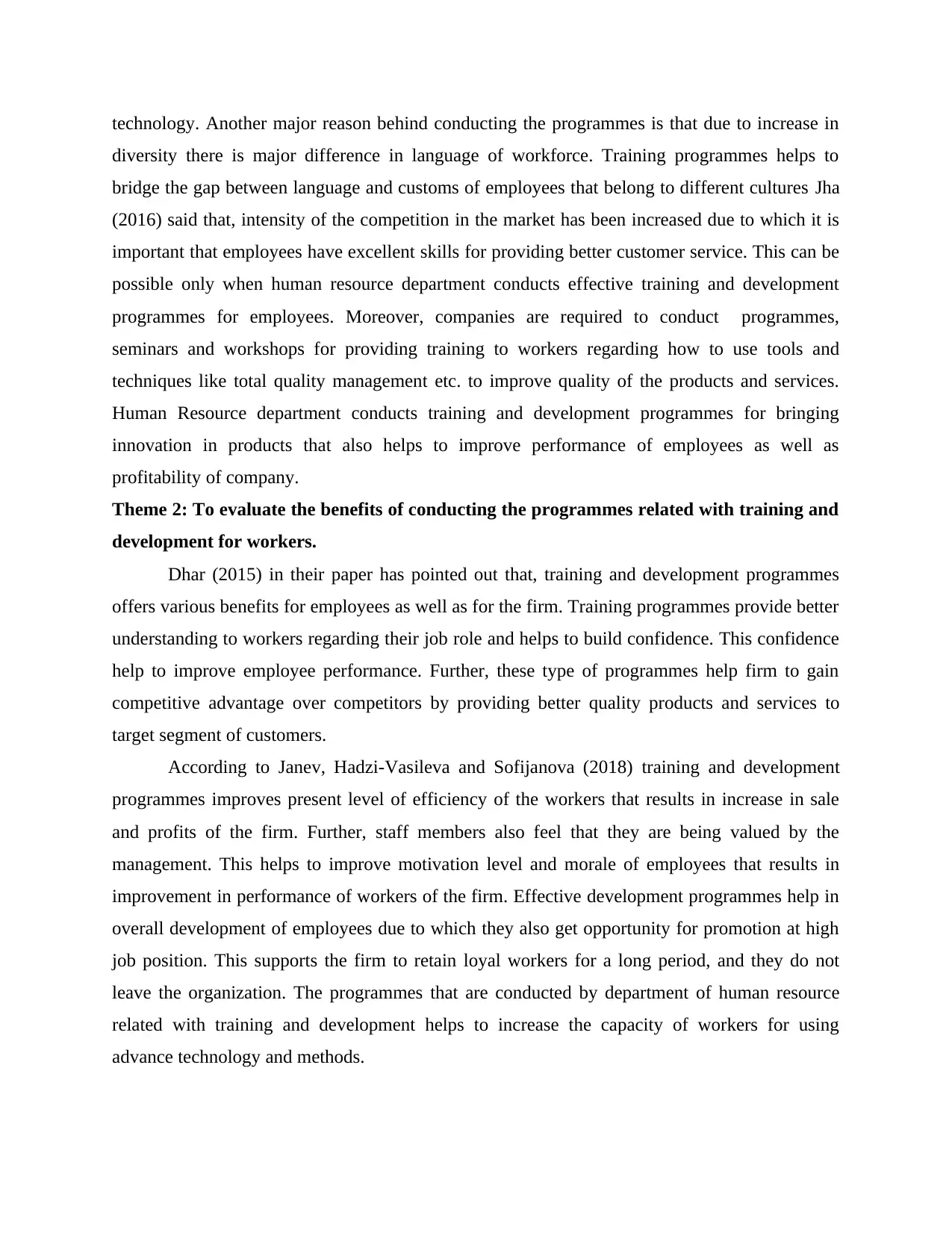
technology. Another major reason behind conducting the programmes is that due to increase in
diversity there is major difference in language of workforce. Training programmes helps to
bridge the gap between language and customs of employees that belong to different cultures Jha
(2016) said that, intensity of the competition in the market has been increased due to which it is
important that employees have excellent skills for providing better customer service. This can be
possible only when human resource department conducts effective training and development
programmes for employees. Moreover, companies are required to conduct programmes,
seminars and workshops for providing training to workers regarding how to use tools and
techniques like total quality management etc. to improve quality of the products and services.
Human Resource department conducts training and development programmes for bringing
innovation in products that also helps to improve performance of employees as well as
profitability of company.
Theme 2: To evaluate the benefits of conducting the programmes related with training and
development for workers.
Dhar (2015) in their paper has pointed out that, training and development programmes
offers various benefits for employees as well as for the firm. Training programmes provide better
understanding to workers regarding their job role and helps to build confidence. This confidence
help to improve employee performance. Further, these type of programmes help firm to gain
competitive advantage over competitors by providing better quality products and services to
target segment of customers.
According to Janev, Hadzi-Vasileva and Sofijanova (2018) training and development
programmes improves present level of efficiency of the workers that results in increase in sale
and profits of the firm. Further, staff members also feel that they are being valued by the
management. This helps to improve motivation level and morale of employees that results in
improvement in performance of workers of the firm. Effective development programmes help in
overall development of employees due to which they also get opportunity for promotion at high
job position. This supports the firm to retain loyal workers for a long period, and they do not
leave the organization. The programmes that are conducted by department of human resource
related with training and development helps to increase the capacity of workers for using
advance technology and methods.
diversity there is major difference in language of workforce. Training programmes helps to
bridge the gap between language and customs of employees that belong to different cultures Jha
(2016) said that, intensity of the competition in the market has been increased due to which it is
important that employees have excellent skills for providing better customer service. This can be
possible only when human resource department conducts effective training and development
programmes for employees. Moreover, companies are required to conduct programmes,
seminars and workshops for providing training to workers regarding how to use tools and
techniques like total quality management etc. to improve quality of the products and services.
Human Resource department conducts training and development programmes for bringing
innovation in products that also helps to improve performance of employees as well as
profitability of company.
Theme 2: To evaluate the benefits of conducting the programmes related with training and
development for workers.
Dhar (2015) in their paper has pointed out that, training and development programmes
offers various benefits for employees as well as for the firm. Training programmes provide better
understanding to workers regarding their job role and helps to build confidence. This confidence
help to improve employee performance. Further, these type of programmes help firm to gain
competitive advantage over competitors by providing better quality products and services to
target segment of customers.
According to Janev, Hadzi-Vasileva and Sofijanova (2018) training and development
programmes improves present level of efficiency of the workers that results in increase in sale
and profits of the firm. Further, staff members also feel that they are being valued by the
management. This helps to improve motivation level and morale of employees that results in
improvement in performance of workers of the firm. Effective development programmes help in
overall development of employees due to which they also get opportunity for promotion at high
job position. This supports the firm to retain loyal workers for a long period, and they do not
leave the organization. The programmes that are conducted by department of human resource
related with training and development helps to increase the capacity of workers for using
advance technology and methods.
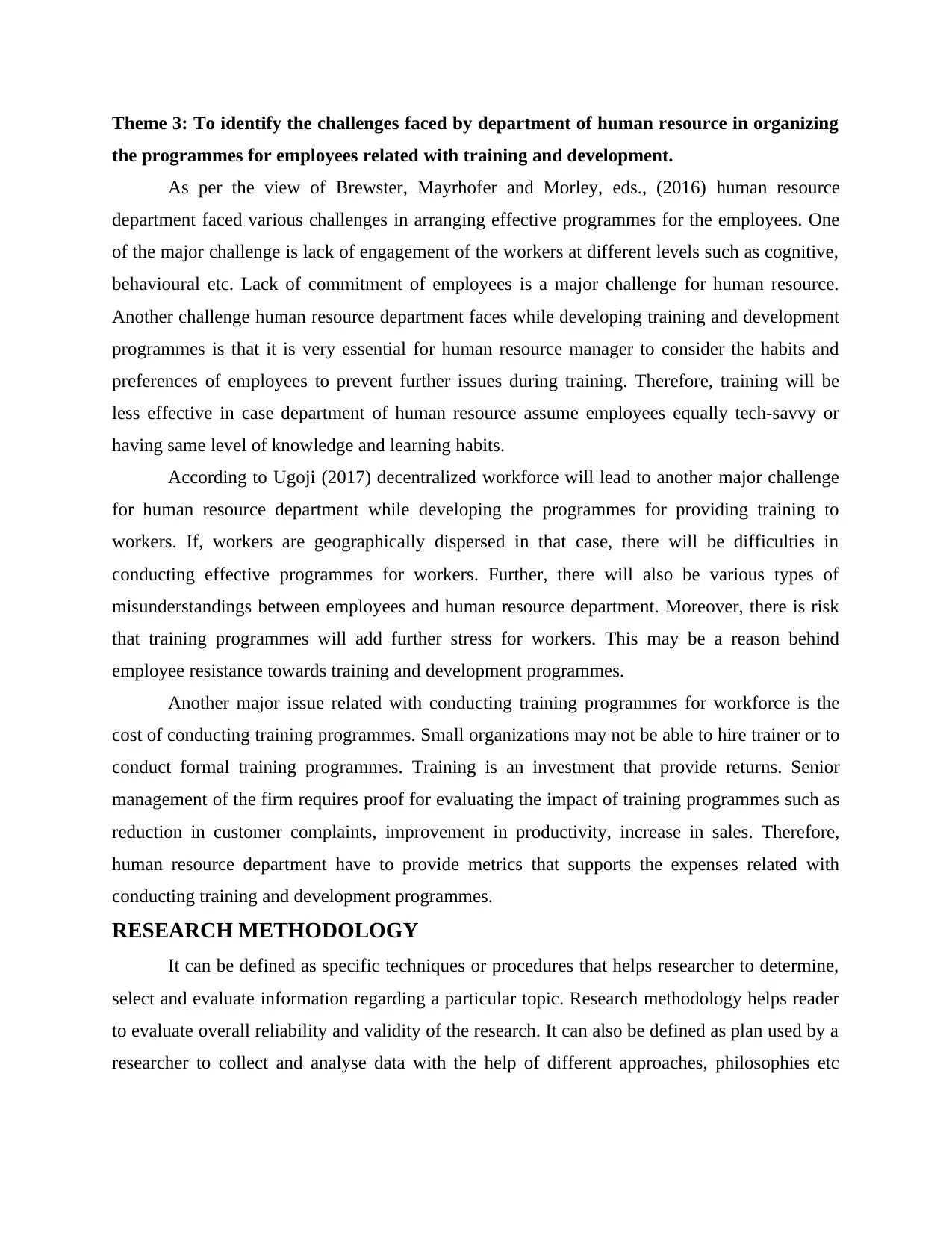
Theme 3: To identify the challenges faced by department of human resource in organizing
the programmes for employees related with training and development.
As per the view of Brewster, Mayrhofer and Morley, eds., (2016) human resource
department faced various challenges in arranging effective programmes for the employees. One
of the major challenge is lack of engagement of the workers at different levels such as cognitive,
behavioural etc. Lack of commitment of employees is a major challenge for human resource.
Another challenge human resource department faces while developing training and development
programmes is that it is very essential for human resource manager to consider the habits and
preferences of employees to prevent further issues during training. Therefore, training will be
less effective in case department of human resource assume employees equally tech-savvy or
having same level of knowledge and learning habits.
According to Ugoji (2017) decentralized workforce will lead to another major challenge
for human resource department while developing the programmes for providing training to
workers. If, workers are geographically dispersed in that case, there will be difficulties in
conducting effective programmes for workers. Further, there will also be various types of
misunderstandings between employees and human resource department. Moreover, there is risk
that training programmes will add further stress for workers. This may be a reason behind
employee resistance towards training and development programmes.
Another major issue related with conducting training programmes for workforce is the
cost of conducting training programmes. Small organizations may not be able to hire trainer or to
conduct formal training programmes. Training is an investment that provide returns. Senior
management of the firm requires proof for evaluating the impact of training programmes such as
reduction in customer complaints, improvement in productivity, increase in sales. Therefore,
human resource department have to provide metrics that supports the expenses related with
conducting training and development programmes.
RESEARCH METHODOLOGY
It can be defined as specific techniques or procedures that helps researcher to determine,
select and evaluate information regarding a particular topic. Research methodology helps reader
to evaluate overall reliability and validity of the research. It can also be defined as plan used by a
researcher to collect and analyse data with the help of different approaches, philosophies etc
the programmes for employees related with training and development.
As per the view of Brewster, Mayrhofer and Morley, eds., (2016) human resource
department faced various challenges in arranging effective programmes for the employees. One
of the major challenge is lack of engagement of the workers at different levels such as cognitive,
behavioural etc. Lack of commitment of employees is a major challenge for human resource.
Another challenge human resource department faces while developing training and development
programmes is that it is very essential for human resource manager to consider the habits and
preferences of employees to prevent further issues during training. Therefore, training will be
less effective in case department of human resource assume employees equally tech-savvy or
having same level of knowledge and learning habits.
According to Ugoji (2017) decentralized workforce will lead to another major challenge
for human resource department while developing the programmes for providing training to
workers. If, workers are geographically dispersed in that case, there will be difficulties in
conducting effective programmes for workers. Further, there will also be various types of
misunderstandings between employees and human resource department. Moreover, there is risk
that training programmes will add further stress for workers. This may be a reason behind
employee resistance towards training and development programmes.
Another major issue related with conducting training programmes for workforce is the
cost of conducting training programmes. Small organizations may not be able to hire trainer or to
conduct formal training programmes. Training is an investment that provide returns. Senior
management of the firm requires proof for evaluating the impact of training programmes such as
reduction in customer complaints, improvement in productivity, increase in sales. Therefore,
human resource department have to provide metrics that supports the expenses related with
conducting training and development programmes.
RESEARCH METHODOLOGY
It can be defined as specific techniques or procedures that helps researcher to determine,
select and evaluate information regarding a particular topic. Research methodology helps reader
to evaluate overall reliability and validity of the research. It can also be defined as plan used by a
researcher to collect and analyse data with the help of different approaches, philosophies etc
⊘ This is a preview!⊘
Do you want full access?
Subscribe today to unlock all pages.

Trusted by 1+ million students worldwide
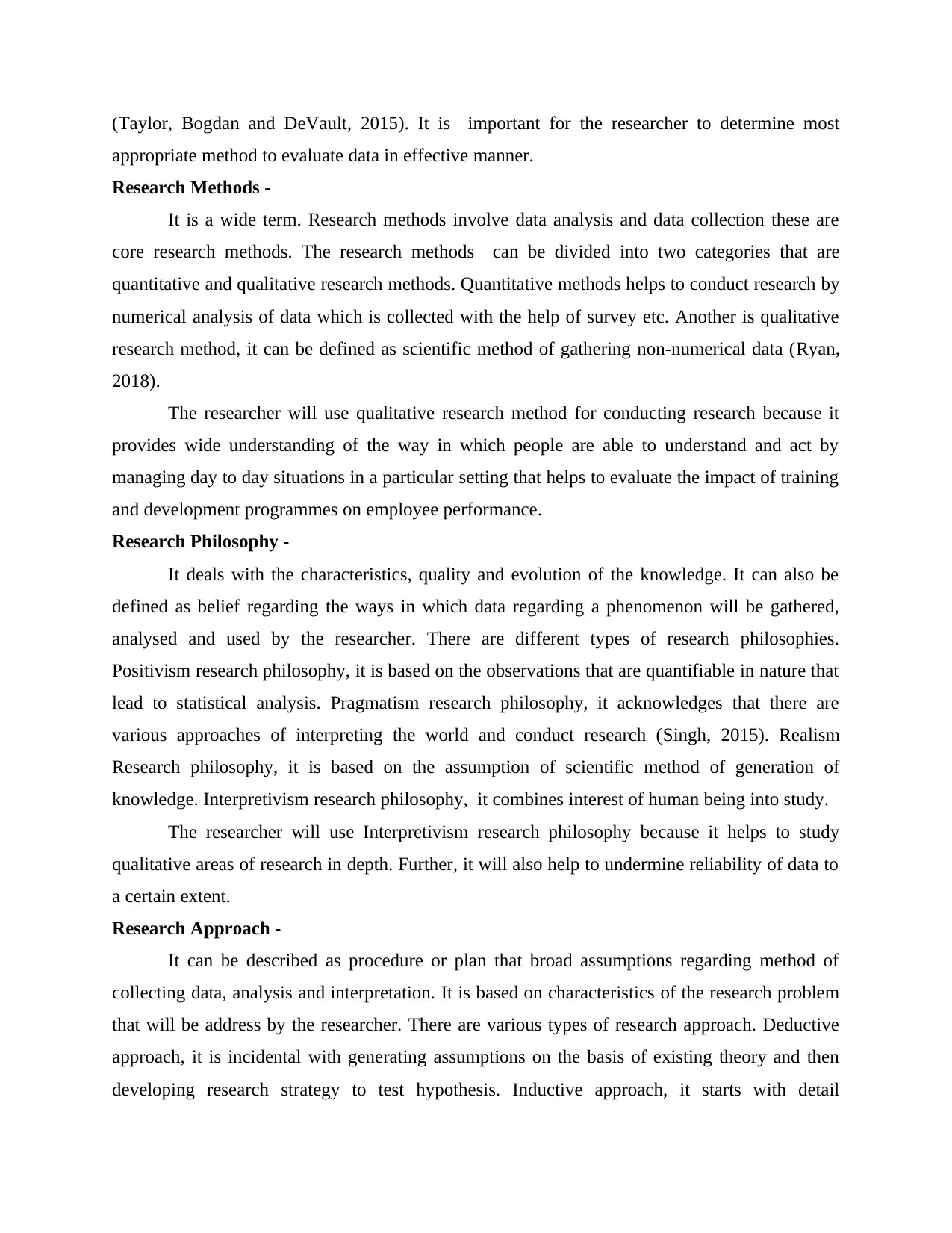
(Taylor, Bogdan and DeVault, 2015). It is important for the researcher to determine most
appropriate method to evaluate data in effective manner.
Research Methods -
It is a wide term. Research methods involve data analysis and data collection these are
core research methods. The research methods can be divided into two categories that are
quantitative and qualitative research methods. Quantitative methods helps to conduct research by
numerical analysis of data which is collected with the help of survey etc. Another is qualitative
research method, it can be defined as scientific method of gathering non-numerical data (Ryan,
2018).
The researcher will use qualitative research method for conducting research because it
provides wide understanding of the way in which people are able to understand and act by
managing day to day situations in a particular setting that helps to evaluate the impact of training
and development programmes on employee performance.
Research Philosophy -
It deals with the characteristics, quality and evolution of the knowledge. It can also be
defined as belief regarding the ways in which data regarding a phenomenon will be gathered,
analysed and used by the researcher. There are different types of research philosophies.
Positivism research philosophy, it is based on the observations that are quantifiable in nature that
lead to statistical analysis. Pragmatism research philosophy, it acknowledges that there are
various approaches of interpreting the world and conduct research (Singh, 2015). Realism
Research philosophy, it is based on the assumption of scientific method of generation of
knowledge. Interpretivism research philosophy, it combines interest of human being into study.
The researcher will use Interpretivism research philosophy because it helps to study
qualitative areas of research in depth. Further, it will also help to undermine reliability of data to
a certain extent.
Research Approach -
It can be described as procedure or plan that broad assumptions regarding method of
collecting data, analysis and interpretation. It is based on characteristics of the research problem
that will be address by the researcher. There are various types of research approach. Deductive
approach, it is incidental with generating assumptions on the basis of existing theory and then
developing research strategy to test hypothesis. Inductive approach, it starts with detail
appropriate method to evaluate data in effective manner.
Research Methods -
It is a wide term. Research methods involve data analysis and data collection these are
core research methods. The research methods can be divided into two categories that are
quantitative and qualitative research methods. Quantitative methods helps to conduct research by
numerical analysis of data which is collected with the help of survey etc. Another is qualitative
research method, it can be defined as scientific method of gathering non-numerical data (Ryan,
2018).
The researcher will use qualitative research method for conducting research because it
provides wide understanding of the way in which people are able to understand and act by
managing day to day situations in a particular setting that helps to evaluate the impact of training
and development programmes on employee performance.
Research Philosophy -
It deals with the characteristics, quality and evolution of the knowledge. It can also be
defined as belief regarding the ways in which data regarding a phenomenon will be gathered,
analysed and used by the researcher. There are different types of research philosophies.
Positivism research philosophy, it is based on the observations that are quantifiable in nature that
lead to statistical analysis. Pragmatism research philosophy, it acknowledges that there are
various approaches of interpreting the world and conduct research (Singh, 2015). Realism
Research philosophy, it is based on the assumption of scientific method of generation of
knowledge. Interpretivism research philosophy, it combines interest of human being into study.
The researcher will use Interpretivism research philosophy because it helps to study
qualitative areas of research in depth. Further, it will also help to undermine reliability of data to
a certain extent.
Research Approach -
It can be described as procedure or plan that broad assumptions regarding method of
collecting data, analysis and interpretation. It is based on characteristics of the research problem
that will be address by the researcher. There are various types of research approach. Deductive
approach, it is incidental with generating assumptions on the basis of existing theory and then
developing research strategy to test hypothesis. Inductive approach, it starts with detail
Paraphrase This Document
Need a fresh take? Get an instant paraphrase of this document with our AI Paraphraser
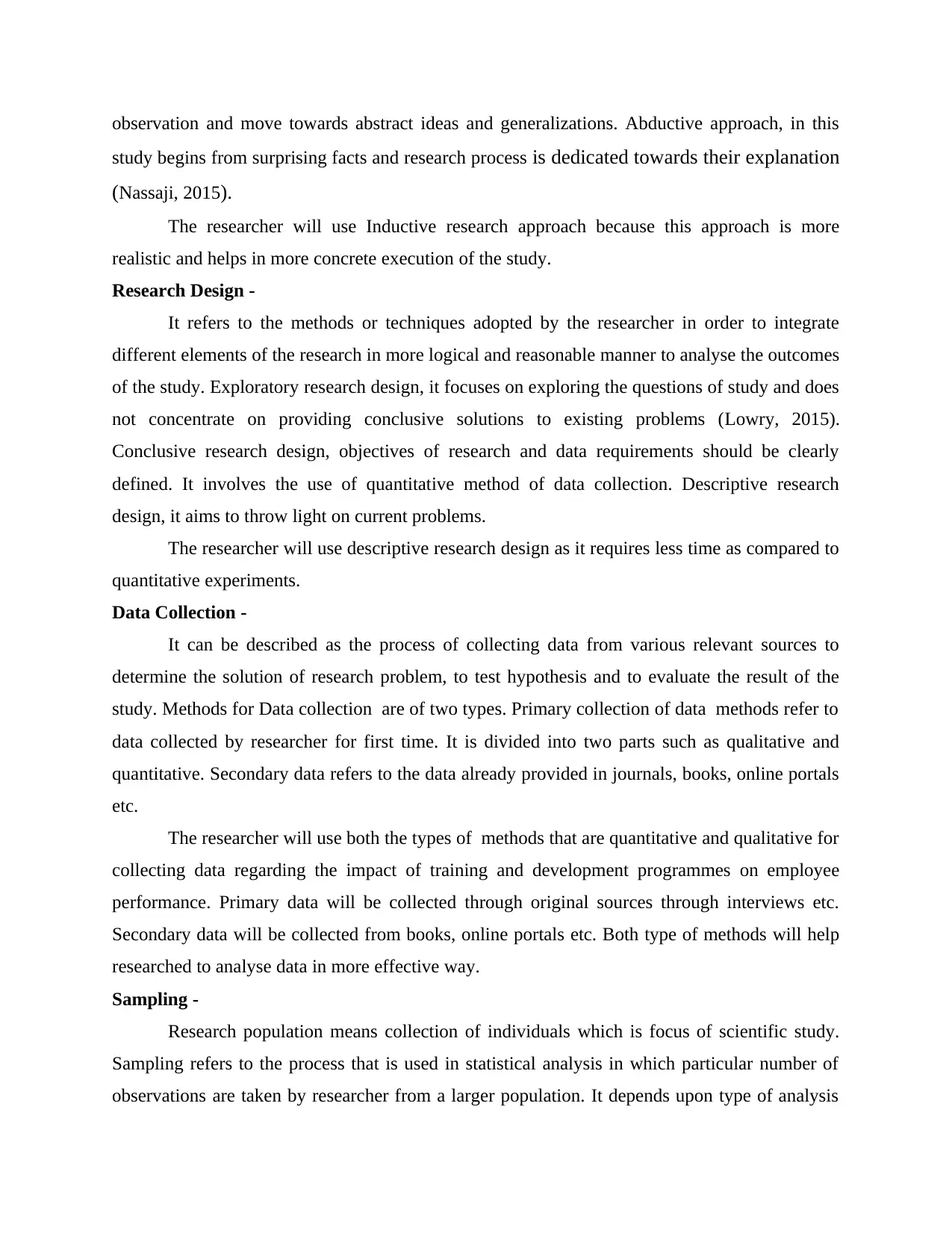
observation and move towards abstract ideas and generalizations. Abductive approach, in this
study begins from surprising facts and research process is dedicated towards their explanation
(Nassaji, 2015).
The researcher will use Inductive research approach because this approach is more
realistic and helps in more concrete execution of the study.
Research Design -
It refers to the methods or techniques adopted by the researcher in order to integrate
different elements of the research in more logical and reasonable manner to analyse the outcomes
of the study. Exploratory research design, it focuses on exploring the questions of study and does
not concentrate on providing conclusive solutions to existing problems (Lowry, 2015).
Conclusive research design, objectives of research and data requirements should be clearly
defined. It involves the use of quantitative method of data collection. Descriptive research
design, it aims to throw light on current problems.
The researcher will use descriptive research design as it requires less time as compared to
quantitative experiments.
Data Collection -
It can be described as the process of collecting data from various relevant sources to
determine the solution of research problem, to test hypothesis and to evaluate the result of the
study. Methods for Data collection are of two types. Primary collection of data methods refer to
data collected by researcher for first time. It is divided into two parts such as qualitative and
quantitative. Secondary data refers to the data already provided in journals, books, online portals
etc.
The researcher will use both the types of methods that are quantitative and qualitative for
collecting data regarding the impact of training and development programmes on employee
performance. Primary data will be collected through original sources through interviews etc.
Secondary data will be collected from books, online portals etc. Both type of methods will help
researched to analyse data in more effective way.
Sampling -
Research population means collection of individuals which is focus of scientific study.
Sampling refers to the process that is used in statistical analysis in which particular number of
observations are taken by researcher from a larger population. It depends upon type of analysis
study begins from surprising facts and research process is dedicated towards their explanation
(Nassaji, 2015).
The researcher will use Inductive research approach because this approach is more
realistic and helps in more concrete execution of the study.
Research Design -
It refers to the methods or techniques adopted by the researcher in order to integrate
different elements of the research in more logical and reasonable manner to analyse the outcomes
of the study. Exploratory research design, it focuses on exploring the questions of study and does
not concentrate on providing conclusive solutions to existing problems (Lowry, 2015).
Conclusive research design, objectives of research and data requirements should be clearly
defined. It involves the use of quantitative method of data collection. Descriptive research
design, it aims to throw light on current problems.
The researcher will use descriptive research design as it requires less time as compared to
quantitative experiments.
Data Collection -
It can be described as the process of collecting data from various relevant sources to
determine the solution of research problem, to test hypothesis and to evaluate the result of the
study. Methods for Data collection are of two types. Primary collection of data methods refer to
data collected by researcher for first time. It is divided into two parts such as qualitative and
quantitative. Secondary data refers to the data already provided in journals, books, online portals
etc.
The researcher will use both the types of methods that are quantitative and qualitative for
collecting data regarding the impact of training and development programmes on employee
performance. Primary data will be collected through original sources through interviews etc.
Secondary data will be collected from books, online portals etc. Both type of methods will help
researched to analyse data in more effective way.
Sampling -
Research population means collection of individuals which is focus of scientific study.
Sampling refers to the process that is used in statistical analysis in which particular number of
observations are taken by researcher from a larger population. It depends upon type of analysis
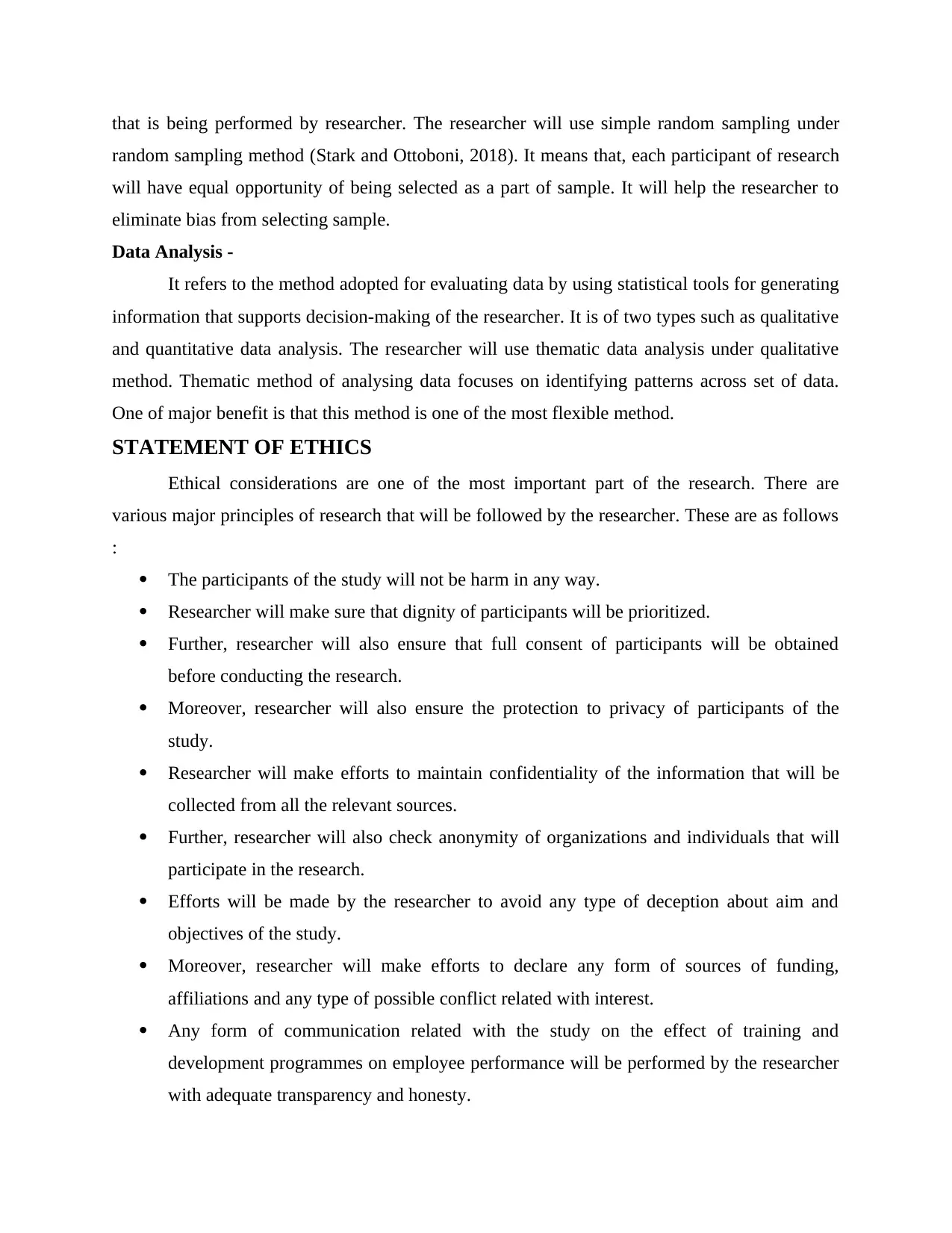
that is being performed by researcher. The researcher will use simple random sampling under
random sampling method (Stark and Ottoboni, 2018). It means that, each participant of research
will have equal opportunity of being selected as a part of sample. It will help the researcher to
eliminate bias from selecting sample.
Data Analysis -
It refers to the method adopted for evaluating data by using statistical tools for generating
information that supports decision-making of the researcher. It is of two types such as qualitative
and quantitative data analysis. The researcher will use thematic data analysis under qualitative
method. Thematic method of analysing data focuses on identifying patterns across set of data.
One of major benefit is that this method is one of the most flexible method.
STATEMENT OF ETHICS
Ethical considerations are one of the most important part of the research. There are
various major principles of research that will be followed by the researcher. These are as follows
:
The participants of the study will not be harm in any way.
Researcher will make sure that dignity of participants will be prioritized.
Further, researcher will also ensure that full consent of participants will be obtained
before conducting the research.
Moreover, researcher will also ensure the protection to privacy of participants of the
study.
Researcher will make efforts to maintain confidentiality of the information that will be
collected from all the relevant sources.
Further, researcher will also check anonymity of organizations and individuals that will
participate in the research.
Efforts will be made by the researcher to avoid any type of deception about aim and
objectives of the study.
Moreover, researcher will make efforts to declare any form of sources of funding,
affiliations and any type of possible conflict related with interest.
Any form of communication related with the study on the effect of training and
development programmes on employee performance will be performed by the researcher
with adequate transparency and honesty.
random sampling method (Stark and Ottoboni, 2018). It means that, each participant of research
will have equal opportunity of being selected as a part of sample. It will help the researcher to
eliminate bias from selecting sample.
Data Analysis -
It refers to the method adopted for evaluating data by using statistical tools for generating
information that supports decision-making of the researcher. It is of two types such as qualitative
and quantitative data analysis. The researcher will use thematic data analysis under qualitative
method. Thematic method of analysing data focuses on identifying patterns across set of data.
One of major benefit is that this method is one of the most flexible method.
STATEMENT OF ETHICS
Ethical considerations are one of the most important part of the research. There are
various major principles of research that will be followed by the researcher. These are as follows
:
The participants of the study will not be harm in any way.
Researcher will make sure that dignity of participants will be prioritized.
Further, researcher will also ensure that full consent of participants will be obtained
before conducting the research.
Moreover, researcher will also ensure the protection to privacy of participants of the
study.
Researcher will make efforts to maintain confidentiality of the information that will be
collected from all the relevant sources.
Further, researcher will also check anonymity of organizations and individuals that will
participate in the research.
Efforts will be made by the researcher to avoid any type of deception about aim and
objectives of the study.
Moreover, researcher will make efforts to declare any form of sources of funding,
affiliations and any type of possible conflict related with interest.
Any form of communication related with the study on the effect of training and
development programmes on employee performance will be performed by the researcher
with adequate transparency and honesty.
⊘ This is a preview!⊘
Do you want full access?
Subscribe today to unlock all pages.

Trusted by 1+ million students worldwide
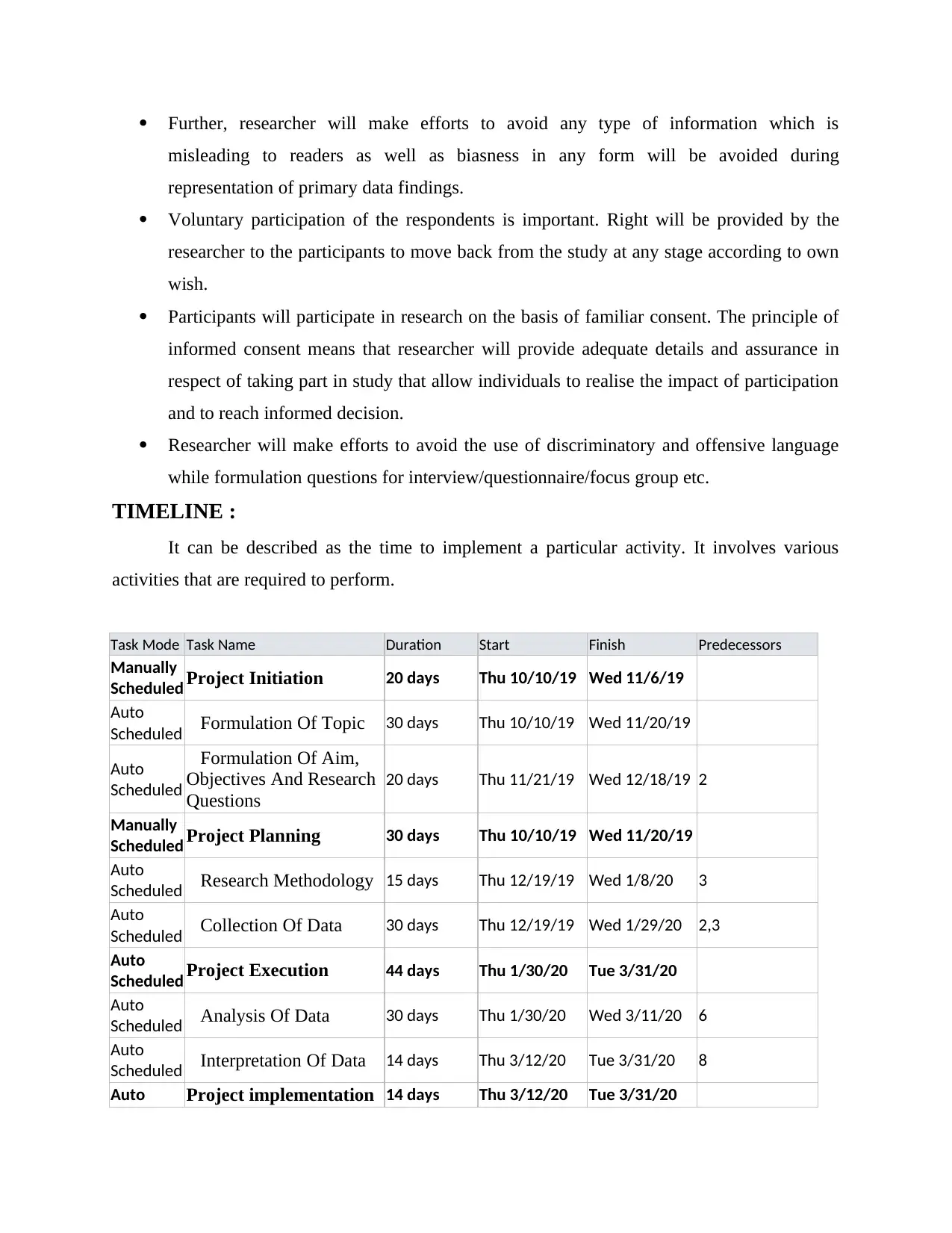
Further, researcher will make efforts to avoid any type of information which is
misleading to readers as well as biasness in any form will be avoided during
representation of primary data findings.
Voluntary participation of the respondents is important. Right will be provided by the
researcher to the participants to move back from the study at any stage according to own
wish.
Participants will participate in research on the basis of familiar consent. The principle of
informed consent means that researcher will provide adequate details and assurance in
respect of taking part in study that allow individuals to realise the impact of participation
and to reach informed decision.
Researcher will make efforts to avoid the use of discriminatory and offensive language
while formulation questions for interview/questionnaire/focus group etc.
TIMELINE :
It can be described as the time to implement a particular activity. It involves various
activities that are required to perform.
Task Mode Task Name Duration Start Finish Predecessors
Manually
Scheduled Project Initiation 20 days Thu 10/10/19 Wed 11/6/19
Auto
Scheduled Formulation Of Topic 30 days Thu 10/10/19 Wed 11/20/19
Auto
Scheduled
Formulation Of Aim,
Objectives And Research
Questions
20 days Thu 11/21/19 Wed 12/18/19 2
Manually
Scheduled Project Planning 30 days Thu 10/10/19 Wed 11/20/19
Auto
Scheduled Research Methodology 15 days Thu 12/19/19 Wed 1/8/20 3
Auto
Scheduled Collection Of Data 30 days Thu 12/19/19 Wed 1/29/20 2,3
Auto
Scheduled Project Execution 44 days Thu 1/30/20 Tue 3/31/20
Auto
Scheduled Analysis Of Data 30 days Thu 1/30/20 Wed 3/11/20 6
Auto
Scheduled Interpretation Of Data 14 days Thu 3/12/20 Tue 3/31/20 8
Auto Project implementation 14 days Thu 3/12/20 Tue 3/31/20
misleading to readers as well as biasness in any form will be avoided during
representation of primary data findings.
Voluntary participation of the respondents is important. Right will be provided by the
researcher to the participants to move back from the study at any stage according to own
wish.
Participants will participate in research on the basis of familiar consent. The principle of
informed consent means that researcher will provide adequate details and assurance in
respect of taking part in study that allow individuals to realise the impact of participation
and to reach informed decision.
Researcher will make efforts to avoid the use of discriminatory and offensive language
while formulation questions for interview/questionnaire/focus group etc.
TIMELINE :
It can be described as the time to implement a particular activity. It involves various
activities that are required to perform.
Task Mode Task Name Duration Start Finish Predecessors
Manually
Scheduled Project Initiation 20 days Thu 10/10/19 Wed 11/6/19
Auto
Scheduled Formulation Of Topic 30 days Thu 10/10/19 Wed 11/20/19
Auto
Scheduled
Formulation Of Aim,
Objectives And Research
Questions
20 days Thu 11/21/19 Wed 12/18/19 2
Manually
Scheduled Project Planning 30 days Thu 10/10/19 Wed 11/20/19
Auto
Scheduled Research Methodology 15 days Thu 12/19/19 Wed 1/8/20 3
Auto
Scheduled Collection Of Data 30 days Thu 12/19/19 Wed 1/29/20 2,3
Auto
Scheduled Project Execution 44 days Thu 1/30/20 Tue 3/31/20
Auto
Scheduled Analysis Of Data 30 days Thu 1/30/20 Wed 3/11/20 6
Auto
Scheduled Interpretation Of Data 14 days Thu 3/12/20 Tue 3/31/20 8
Auto Project implementation 14 days Thu 3/12/20 Tue 3/31/20
Paraphrase This Document
Need a fresh take? Get an instant paraphrase of this document with our AI Paraphraser
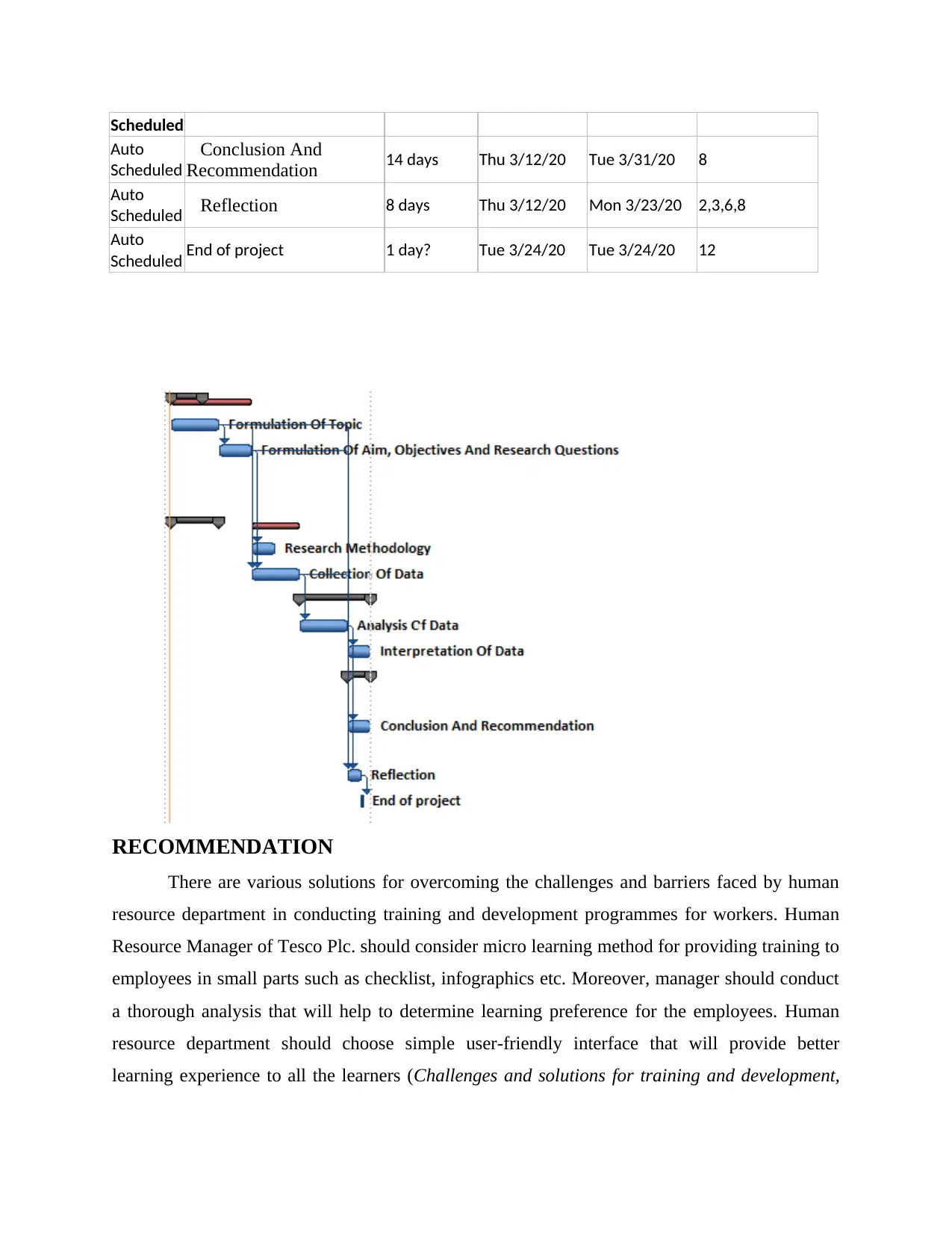
Scheduled
Auto
Scheduled
Conclusion And
Recommendation 14 days Thu 3/12/20 Tue 3/31/20 8
Auto
Scheduled Reflection 8 days Thu 3/12/20 Mon 3/23/20 2,3,6,8
Auto
Scheduled End of project 1 day? Tue 3/24/20 Tue 3/24/20 12
RECOMMENDATION
There are various solutions for overcoming the challenges and barriers faced by human
resource department in conducting training and development programmes for workers. Human
Resource Manager of Tesco Plc. should consider micro learning method for providing training to
employees in small parts such as checklist, infographics etc. Moreover, manager should conduct
a thorough analysis that will help to determine learning preference for the employees. Human
resource department should choose simple user-friendly interface that will provide better
learning experience to all the learners (Challenges and solutions for training and development,
Auto
Scheduled
Conclusion And
Recommendation 14 days Thu 3/12/20 Tue 3/31/20 8
Auto
Scheduled Reflection 8 days Thu 3/12/20 Mon 3/23/20 2,3,6,8
Auto
Scheduled End of project 1 day? Tue 3/24/20 Tue 3/24/20 12
RECOMMENDATION
There are various solutions for overcoming the challenges and barriers faced by human
resource department in conducting training and development programmes for workers. Human
Resource Manager of Tesco Plc. should consider micro learning method for providing training to
employees in small parts such as checklist, infographics etc. Moreover, manager should conduct
a thorough analysis that will help to determine learning preference for the employees. Human
resource department should choose simple user-friendly interface that will provide better
learning experience to all the learners (Challenges and solutions for training and development,
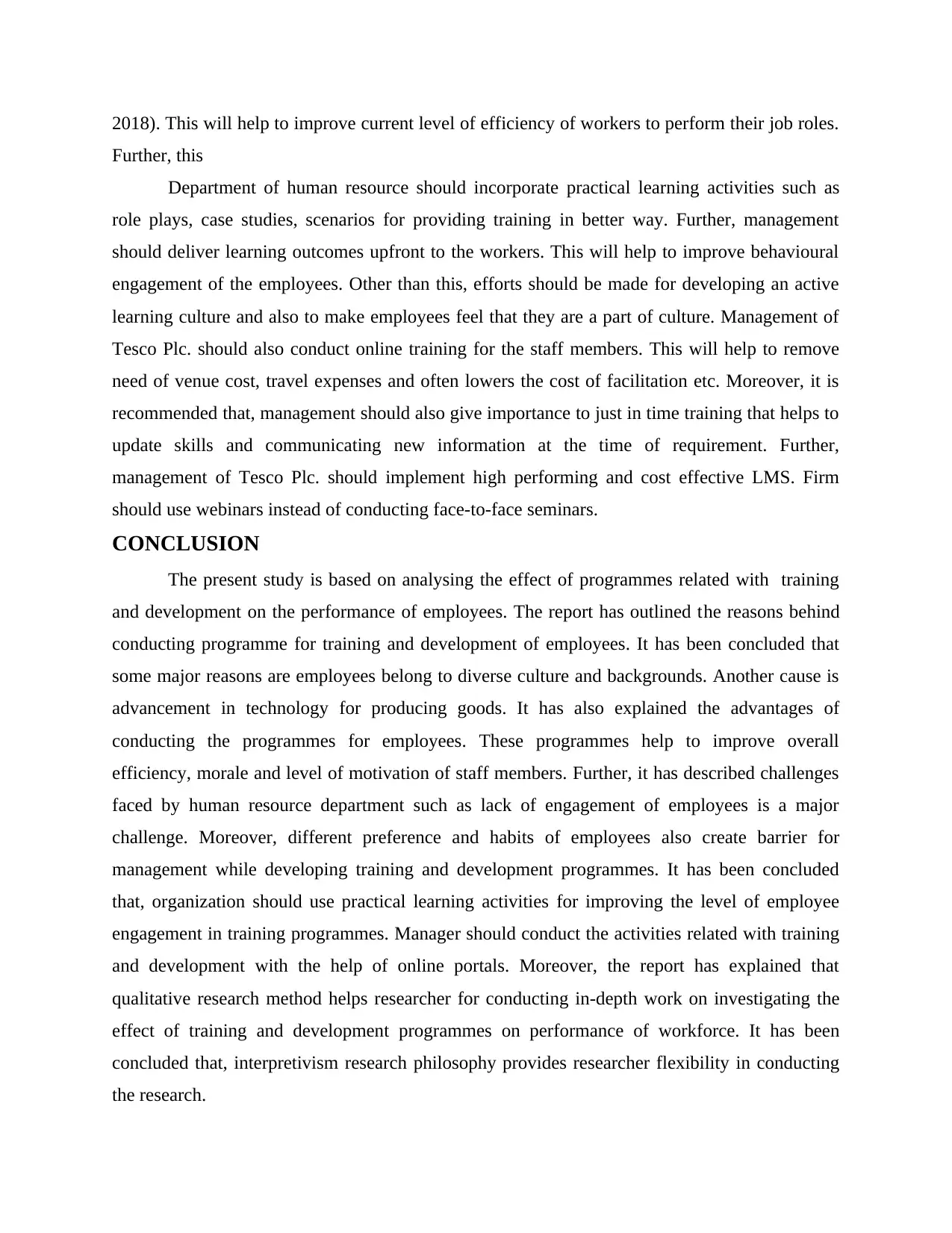
2018). This will help to improve current level of efficiency of workers to perform their job roles.
Further, this
Department of human resource should incorporate practical learning activities such as
role plays, case studies, scenarios for providing training in better way. Further, management
should deliver learning outcomes upfront to the workers. This will help to improve behavioural
engagement of the employees. Other than this, efforts should be made for developing an active
learning culture and also to make employees feel that they are a part of culture. Management of
Tesco Plc. should also conduct online training for the staff members. This will help to remove
need of venue cost, travel expenses and often lowers the cost of facilitation etc. Moreover, it is
recommended that, management should also give importance to just in time training that helps to
update skills and communicating new information at the time of requirement. Further,
management of Tesco Plc. should implement high performing and cost effective LMS. Firm
should use webinars instead of conducting face-to-face seminars.
CONCLUSION
The present study is based on analysing the effect of programmes related with training
and development on the performance of employees. The report has outlined the reasons behind
conducting programme for training and development of employees. It has been concluded that
some major reasons are employees belong to diverse culture and backgrounds. Another cause is
advancement in technology for producing goods. It has also explained the advantages of
conducting the programmes for employees. These programmes help to improve overall
efficiency, morale and level of motivation of staff members. Further, it has described challenges
faced by human resource department such as lack of engagement of employees is a major
challenge. Moreover, different preference and habits of employees also create barrier for
management while developing training and development programmes. It has been concluded
that, organization should use practical learning activities for improving the level of employee
engagement in training programmes. Manager should conduct the activities related with training
and development with the help of online portals. Moreover, the report has explained that
qualitative research method helps researcher for conducting in-depth work on investigating the
effect of training and development programmes on performance of workforce. It has been
concluded that, interpretivism research philosophy provides researcher flexibility in conducting
the research.
Further, this
Department of human resource should incorporate practical learning activities such as
role plays, case studies, scenarios for providing training in better way. Further, management
should deliver learning outcomes upfront to the workers. This will help to improve behavioural
engagement of the employees. Other than this, efforts should be made for developing an active
learning culture and also to make employees feel that they are a part of culture. Management of
Tesco Plc. should also conduct online training for the staff members. This will help to remove
need of venue cost, travel expenses and often lowers the cost of facilitation etc. Moreover, it is
recommended that, management should also give importance to just in time training that helps to
update skills and communicating new information at the time of requirement. Further,
management of Tesco Plc. should implement high performing and cost effective LMS. Firm
should use webinars instead of conducting face-to-face seminars.
CONCLUSION
The present study is based on analysing the effect of programmes related with training
and development on the performance of employees. The report has outlined the reasons behind
conducting programme for training and development of employees. It has been concluded that
some major reasons are employees belong to diverse culture and backgrounds. Another cause is
advancement in technology for producing goods. It has also explained the advantages of
conducting the programmes for employees. These programmes help to improve overall
efficiency, morale and level of motivation of staff members. Further, it has described challenges
faced by human resource department such as lack of engagement of employees is a major
challenge. Moreover, different preference and habits of employees also create barrier for
management while developing training and development programmes. It has been concluded
that, organization should use practical learning activities for improving the level of employee
engagement in training programmes. Manager should conduct the activities related with training
and development with the help of online portals. Moreover, the report has explained that
qualitative research method helps researcher for conducting in-depth work on investigating the
effect of training and development programmes on performance of workforce. It has been
concluded that, interpretivism research philosophy provides researcher flexibility in conducting
the research.
⊘ This is a preview!⊘
Do you want full access?
Subscribe today to unlock all pages.

Trusted by 1+ million students worldwide
1 out of 15
Related Documents
Your All-in-One AI-Powered Toolkit for Academic Success.
+13062052269
info@desklib.com
Available 24*7 on WhatsApp / Email
![[object Object]](/_next/static/media/star-bottom.7253800d.svg)
Unlock your academic potential
Copyright © 2020–2026 A2Z Services. All Rights Reserved. Developed and managed by ZUCOL.





